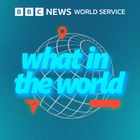
What in the World
Oct 31, 2024
The practice of sending money to family in other countries - known as remittances - is widespread. The World Bank estimates that over $650 billion was sent to low- and middle-income countries in 2023. When it comes to the flow of money from the U.S. to African nations, some people use the term ”black tax.”
As costs are rising around the world, some people are saying it's becoming harder to afford to send money. And recently Kenyan influencer and comedian Elsa Majimbo reignited the long-running debate when she said on Instagram that she hated sending money abroad.
Two BBC journalists, Itoro Bassey in the United States and Makuochi Okafor in Nigeria, talk about their personal experiences of sending or receiving money. And they discuss the broader economic and cultural factors that underpin the issue.
We also hear a range of views from people who send money to relatives in Africa and some who receive it.
Instagram: @bbcwhatintheworld WhatsApp: +44 0330 12 33 22 6 Email: [email protected] Presenter: William Lee Adams Producers: Julia Ross-Roy, Hayley Clarke and Adam Chowdhury Editor: Verity Wilde

